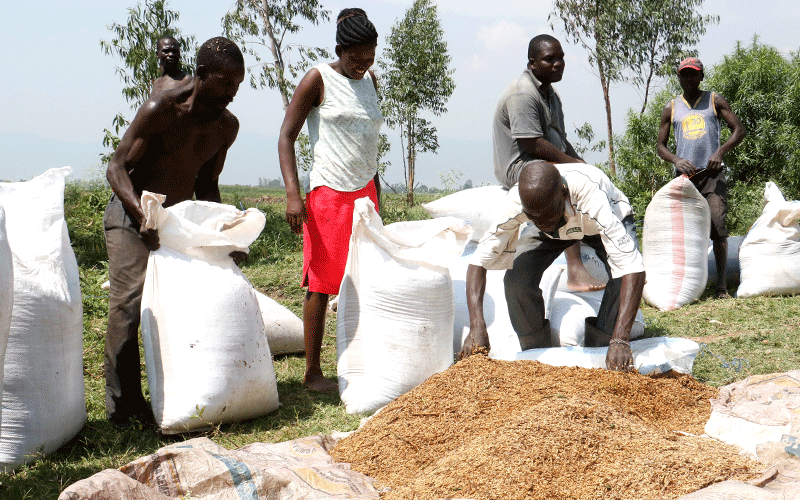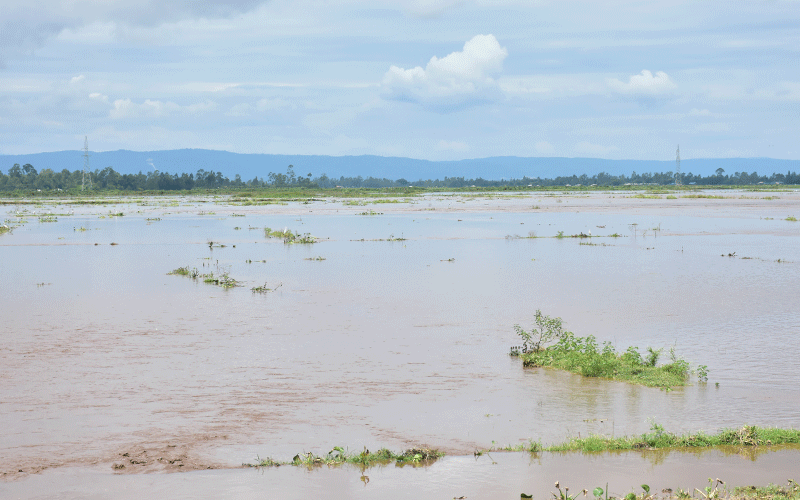Coronavirus bug bites Ahero Ahero Irrigation Scheme farmers
By Noven Owiti, April 28, 2020
Rice farmers under Ahero Irrigation Scheme in Nyando Sub-county are coping with the devastating effects of coronavirus outbreak amid looming fears of low productivity of the crop due the onset of floods.
Agribiz has established that the farmers are already bearing the brunt of the epidemic due to scaling down of staff at the National Irrigation Authority (NIA).
The schemes chairman, Dr Julius Kung’u, says the coronavirus pandemic has hit rice farming hard in the area and farmers are staring at possible low yields as a result.
“Routine activities in the scheme have drastically reduced because most NIA staff have been sent home in mitigation measures to tame the virus spread,” he says.
Production shortfalls
Kung’u said farmers are no longer receiving services offered by the irrigation agency at convenient times.
“Growers in the scheme have started feeling the impact of the Covid-19 epidemic.
“The crop production may go down significantly because of lack of staff to manage water during rice production,” he said.
The chairman pointed out that the scheme is likely to run out of supply of rice to markets should directives to prevent spread persist.
“The paddies are reducing and the drying floor where we store rice received from farmers are almost empty.
“This means if we are given urgent order to supply to various government institutions, we may not be able to do so due to the slowdown in operations,” explained Kung’u.
He appealed to the government to consider measures to cushion farmers from losses amid the biting effects of the virus.
National Irrigation Authority Western region manager Joel Tanui confirmed that the agency sent home majority of its employees in compliance with recent government directive on keeping social distance.

Tanui said reduction in the number of staff has affected operations particularly water management.
While admitting that the reduction in workforce was likely to negatively impact rice production, Tanui said they are liaising with relevant government agencies to address the matter.
The NIA boss expressed concern that the resulting effect could hamper the country’s dream to attain food security.
“Going by the State directive limiting human contacts, we have reduced our workforce by great margins. We understand this could have grave effects on the productivity of rice in the scheme,” he said.
Tanui said the agency is now milling 200 bags per day, down from 500 bags previously.
The mill has also cut down rice processing to only eight hours a day, from a 24-hour shift following the government’s curfew orders.
“Because of the curfew directive we have rested employees who work at night in rice processing.
Meaning we are operating below capacity and, therefore, there is a strain in terms of food supply to the consumers particularly to the Kenya National trading corporation who are the main buyers of rice on behalf of the government,” said Tanui.
Consequently, Ahero Irrigation Scheme Water Users Association chairman George Owade has urged the government to make NIA fully operational, noting that the farmers entirely rely on water being pumped by the agency.
Production chain affected
There are more than 5,000 bags of un-milled rice pilling up at the mill because of stalled night shift processing.
According to Tanui, the food production chain has also been affected in terms of production systems and supply chain of raw materials and farm inputs.
“Our farmers have a lot of difficulties accessing these critical inputs at a time of need,” he added.
Western Kenya region comprising Ahero, West Kano and Bunyala schemes produces an average of 45,000 metric tonnes of rice annually.

“At the farm level, water management is has become a challenge and growers are worried it will impact negatively on food productivity and security,” he said.
The NIA official recommends the need to put in place urgent and robust mechanisms to boost production such as economically stimulating the local farmers through farm inputs subsidies to ensure they go into full capacity, a move which can guarantee food security in the coming months.
Meanwhile, about 1,500 acres have ben destroyed by the floods Ahero Scheme and 7,500 arcres in rice farms across Nyanza region. “This could lead to a shortfall of 18,000 metric tonnes of rice due to excess water in the farms,” Tanui says.
The agency has been spearheading efforts to drain excess water from the canals. “We are also looking into other measures to ease the situation,” he says.